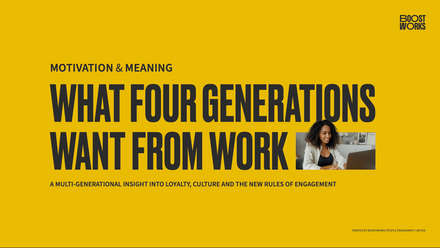Top 10 stories from this week: how we work is shifting and employers need to keep up
The number of part-time workers in the UK now stands at more than eight million people, according to the latest Office for National Statistics figures, with the majority working this way because they want to.
It’s a fact that employers need to take on board if they are to attract and retain the best staff.
Working practices and employee expectations for work are rapidly changing. The trial of the four-day working week is well underway, with HR professionals and even CEOs voicing their views on the future success of this initiative.
Part-time working, hybrid working, flexible working, four-day working week – whatever you want to call it, the when, where and how we work is becoming more fluid and, as such, reward and benefits must adapt to attract and retain employees.
Employers must be open to consider alternative working arrangements and create jobs that are skills-based, which can more flexible than traditional job roles.
It’s an issue we’ll be discussing at the Employee Wellbeing Congress with future workplace expert and FT columnist, Camilla Cavendish, who will challenge you to reframe your thinking on hybrid working, to consider what hybrid working 2.0 might look like.
For more reward and employee benefits news you might have missed this week, read our top 10 snippets below.
Part-time work is lifestyle choice suggests analysis
Personnel today More people are working part-time or in temporary jobs than at any time since the start of the pandemic, with 70% of those working part-time doing so because they don’t want a full-time role. Read more
ESG ‘should be driven’ by HR, says CIPD president
People Management People professionals need to be the driver of ESG targets in business, the president of the CIPD has said.
Opening the second day of conference proceedings at this year’s CIPD Festival of Work, Baroness Ruby McGregor-Smith said that business leaders and C-suite executives needed the help of the profession to meet environmental, social and governance goals. Read more
Healthy retirement out of reach for majority of UK workers
HR Magazine Just 9% of men and 16% of women can expect to reach retirement in good health.
A new report on the UK health system from think tanks IPPR and Future Health recommended an overhaul of the British health system given the small percentage of workers who can currently expect to reach state retirement age (67 by 2028) in good health. Read more
Bill promising neonatal leave and pay
Personnel Today A bill to establish extended paid leave for parents of premature and sick babies will be introduced to parliament today.
If taken forward, the Neonatal Care (Leave and Pay) Bill, which has been tabled by SNP MP Stuart McDonald, would introduce a new entitlement for longer paid time off for parents and carers – over and above maternity, paternity and adoption leave – if a baby has had to spend seven or more consecutive days in hospital in their first four weeks of life. Read more
DWP opens consultation on saver pension choices
Professional Pensions The Department for Work and Pensions (DWP) has opened a consultation to determine what support and information occupational scheme savers expect in the lead up to taking their pension, at the point of access, and as they start to use their savings. Read more
Group critical illness cover claims for 2021 reach £13.2 million
Employee Benefits Group critical illness cover claims nearly doubled from £7.2 million in 2020 to £13.2 million last year, according to new research.
Figures released by financial services firm Legal and General highlight that it paid just over£335 million in group protection claims, including life assurance, income protection and critical illness, in 2021, which is an increase of almost 4% compared to 2020. Read more
Rising childcare costs outstrip maternity pay
HR Magazine The UK's childcare costs are the highest in the developed world, yet maternity pay has dipped over the last 12 years.
Research from the Trades Union Congress (TUC) found childcare costs have risen by £2,200 each year since 2010, coinciding with the Conservative party coming back into power. Read more
MP calls for statutory leave for unpaid carers
People Management Unpaid carers could benefit from one week of statutory unpaid leave under a proposal expected to be heard by Parliament later this year.
Wendy Chamberlain, a Liberal Democrat MP, has said she intends to introduce a Private Members Bill that would give individuals with caring responsibilities the right to five unpaid days off per year. Read more
Lloyds Bank awards staff with £1,000 one-off payment
Employee Benefits More than 64,000 employees at Lloyds Bank will receive a £1,000 one-off payment in order to help with the rising cost of living in the UK.
The payment, which is due to be made in August, will be given to 99.5% of staff but not to senior management or executives. This announcement comes after a campaign by the union Unite, which demonstrated at Lloyds’ annual general meeting last month. Read more
Hybrid working did not reduce economic divides, research finds
People Management Remote working has not led to a reduction in the UK’s geographical economic divides, a report by the Resolution Foundation has found. Read more







